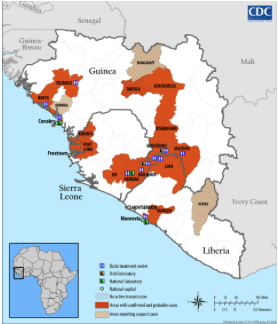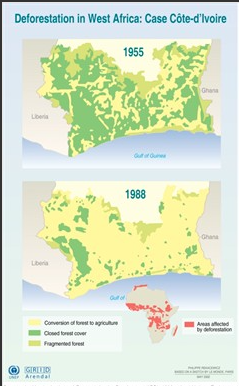Africa supports approximately 30% of the forests in the world, with a large amount of these forests located in Upper Guinea and Lower Guinea (Congo). Yet, these forests have been subject to an immense amount of deforestation. Although deforestation provides people with goods and resources, it is terrible for the balance of the Carbon Cycle and our atmospheric layers. Trees have large amounts of Carbon in their wood, and therefore when they are cut or burned, CO2 is released into the atmosphere. Unless there are enough trees planted or grown to recapture the lost carbon, the exchange between trees and the atmosphere of CO2 is put out of balance, which is a cause of global warming.
Although global warming is a very popular and conversational topic, there is one topic that is stealing everyone’s attention. You guessed it, Ebola. Ebola is one of the most dangerous viruses in the world today, causing many symptoms, one being internal bleeding, and is most likely by followed death. Now, you may be asking, “What does Ebola have to do with deforestation in Guinea?” Well, this latest Ebola epidemic is believed to have started in one of the small towns in Guinea, and has now spread all over West Africa (See Figure 1.).

Figure 1: This map of Africa Depicts what areas Ebola cases have been confirmed or suspected. The highlighted areas in red show where confirmed and probable cases of Ebola have been found. The tan highlighted areas show where suspected cases of Ebola are. As shown in the map, a lot of these highlighted areas are in the Guinea region, where the Ebola epidemic is believed to have started.
People in West Africa commonly eat Fruit Bats in stew, yet bats are known to be carriers of the Ebola Virus. Due to deforestation, many animals’ habitats are being destroyed, including bats. With bat’s habitats destroyed and human’s have moved into prior forest areas, the interactions between bats and people in West Africa has increased greatly. This increased interaction between humans and bats has also greatly increased the chance that one of the fruit bats that are eaten contained the virus Ebola, and sadly this event did occur. Yet, it did not just effect a few people in Guinea, it has spread all over West Africa, taking thousands of people’s lives, and is now spreading into other continents, such as the United States. While the CDC and other organizations are attempting to contain and control this outbreak, it has not had much effect, and the virus continues to spread rapidly.
Ebola, according to the World Health Organization, has already claimed AT LEAST 4,493 lives, and the number is increasing. Yet, what played a major role in this epidemic? It was human’s impact on the environment. Deforestation has claimed not only a vast amount of the forest biomes in West Africa since 1955, it has also claimed thousands of people’s lives. (displayed in Figure 2.),

Figure 2. Shows West Africa in 1955 in the top picture and West Africa in 1988 in the bottom picture. The green represents where “closed forest cover,” or full forest, is, the dark yellow represents ‘Fragmented forest,” and the light yellow represents where deforestation has taken place. These two photos show how drastic deforestation has struck West Africa and therefore gives you an idea of how many animal habitats were destroyed and taken over by humans. The full picture of Africa on the bottom right also shows this by using the red areas to depict where deforestation has taken place. This also refers back to Figure 1. and shows how greatly West Africa and specifically Guinea was affected by deforestation.
While global warming did become a large controversy, hopefully this deadly outbreak of the Ebola virus that has ignited immense fear and panic can express to the public what serious effects humans have on the environment, and how what we do to the environment, can strike back on us.


Kristin,
Your article was very interesting and informative! I had no idea that the origin of Ebola so complex, and could be linked to what we are studying in class. It worries me that deforestation has affected multiple aspects of our lives so negatively, first the carbon cycle, and now, contributing to the transfer of Ebola to humans, because wood is necessary for all of our lives to function. It is one of the most important resources in the world. What do you think we can do to fix this problem (deforestation causing so many issues)? We can’t stop cutting down trees, as we need them as resources. There seems to be no clear solution, but one day there may have to be, as who knows what problems could emerge next.
LikeLike
Kristin,
I liked your article because the topic is relevant to our class and is also a current issue around the world. I was also completely unaware of Ebola’s origin.
I agree that it is important for people to be aware of the cause of this outbreak because it increases concern for the environment. This outbreak with all of its casualties proves to people how crucial environmental protection is to our immediate health. It is easy to ignore environmental issues when they are not physically visible, but when something like the Ebola virus outbreak is caused by deforestation, it can be serious motivation for change and protection of the environment.
LikeLike
The connection you made between what we’re learning in class and something currently relevant in the real world is great. The origin of Ebola, its connection to deforestation, and the consumption of bats is fascinating and new to me. I agree that hopefully now that people can see the horrific effects of deforestation they will acknowledge the negative environmental impact it has. It’ll be interesting to see if the media’s Ebola hysteria will actually have some kind of positive impact.
LikeLike
Hey Kristin,
It was really interesting to see that you have done such a wonderful job connecting such a relevant topic, such as Ebola, to deforestation. Having learned about this in Bio, I can tell you that you are absolutely right. The first diagnosed case of Ebola was a two year old girl in Guinea. The reason that the virus spread so rapidly is because many people in the country eat bush meat, such as the fruit bats. These bats act as a great host for the Ebola virus and when it is consumed by humans, the virus enters the cells and replicates itself. It’s crazy to think the way we treat the environment can affect the spread of disease. When you think of Ebola, deforestation isn’t the first thing that comes into my mind, but maybe it should be. I think that you made a great argument, which was that even the small things we do that we think wont affect the environment, actually does. Overall, I think you did a great job. Thumbs up and keep up the good work.
LikeLike